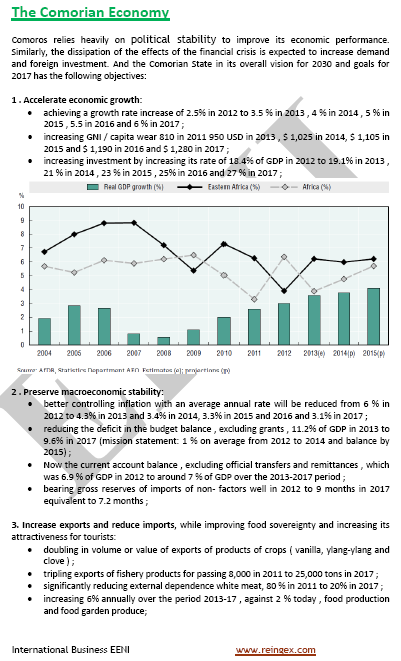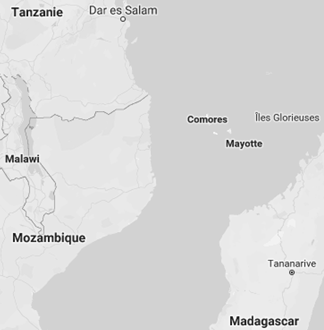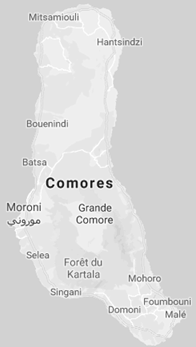Foreign Trade and Transport in the Comoros (Port)
Comoros (Komori) Business in Moroni (Port) Mutsamudu, Domoni, Fomboni

The Comoros (Union of the Comoros) is an Eastern African insular country
- Moroni (Great Comore) is the economic, political and administrative capital of the Comoros and the largest Comorian city
- The largest cities of the Comoros are Moroni, Mutsamudu, Domoni, Fomboni and Tsémbéhou.
- The Comoros is one of the poorest countries in the world
- 50% of the Comorian population lives below the international poverty line (1.25 USD per day)
- The main Comorian economic activities are agriculture, transport, fishing, and forestry
- The Comoros is the first world ylang-ylang producer and an important vanilla
producer
- Vanilla represents 75% of the Comorian exports
- Port of Moroni
- Prince Said Ibrahim International Airport
- The closest African countries to the Union of the Comoros (by sea) are Mozambique, Madagascar, the Seychelles and Tanzania
- The Comoros are north of the Mozambique Channel (Indian Ocean).
 Comoros
Comoros


More information: International Trade and Business in the Comoros, at EENI Global Business School.

- Comorian population: 0.9 million people
- Population density of the Comoros: 392 inhabitants / km²
- The Comoros is a Federal Republic
- Udzima wa Komori in Swahili
- الاتحاد ﺍﻟﻘﻤﺮي in Arabic

- Area of the Comoros: 2,612 km²
- The Comoros is the third smallest African nation
- The Comoros obtained its Independence from France in 1975
- Since its independence, the Comoros has had 20 coup d'état, with the assassination of several heads of state
- Calling code of the Comoros: 269
- Country code top-level domain of the Comoros: .km
- Currency of the Comoros: Comorian Franc
Regions of the Comoros
The Comoros is composed of:
- Autonomous Island of Great Comoros (Ngazidja), Moroni
- Autonomous Island of Anjouan (Nzwani)
- Autonomous Island of Mohéli (Mwali)
The Mayotte Island (Mahore) is occupied by France


Trade and Business Organisations (Comoros)
- Common Market for Eastern and Southern Africa (COMESA)
- U.S.-COMESA Agreement
- Southern African Development Community (SADC)
- COMESA-EAC-SADC Agreement
- Community of Sahel-Saharan States (CEN-SAD)
- Preferential Trade System between the States members of the Organisation of Islamic Cooperation (OCI-TPS)
- Indian Ocean Commission
- IORA
- OHADA
- International Organization of La Francophonie (OIF)
- Islamic Development Bank
- Organisation of Islamic Cooperation
- Arab League
- African Union
- AUDA-NEPAD
- Economic Commission for Africa
- African Development Bank
History of the Comoros
6th century BC: the first human inhabitants of the Comoros are Polynesian and Melanesian settlers, Malaysians and Indonesians, traveling by boat.
- The Bantu settlers arrived to the Comoros Islands as part of the Bantu expansion that took place in Africa during the first millennium.
- Moroni was founded by Arab settlers, perhaps during the 10th century, as the capital of the sultanate in Zanzibar (commercially connected), Tanzania.
- 1503: Portuguese explorers arrive
- 1793: Malagasy warriors began attacking the Comoros Islands to capture slaves
- 1886: Moheli is placed under French protection (Sultan Mardjani Abdou Sheikh)
- 1909: Sultan Muhamed Anjouan abdicates in favour of French domination
- 1973: agreement with France with the Comoros to become independent in 1978.
Main Comorian ethnicities:
- The Comoros share mainly African and Arab origins.
- The most important Comorian ethnic group are Shirazi.
- The main religion in the Comoros is SunniIslam.
Languages of the Comoros
The official languages of the Comoros are French, Arabic, and Shikomori (or Comorian)
Comorian languages:
- Is the most spoken language in the Comoros
- Comorian is a language related to Swahili, with four differentiated variants (Shingazidja, Shimwali, Shinzwani and Shimaore)
Higher Education in the Comoros
- University of the Comoros


 Tweet
Tweet

